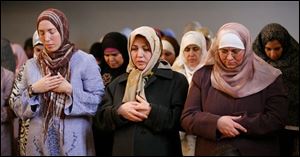
Muslims celebrate Eid, donate meat to needy
12/13/2008
Lailah Ibawi, left, Nazife Amrou, and Jamala Hassan join hundreds of Muslims in prayer during the Eid al-Adha holiday service at the Masjid Saad in Sylvania.
Toledo Muslims are donating more than 1,500 pounds of meat slaughtered for an Islamic holiday to the area's poor and needy.
"Fresh meat is something that is really missing in most food banks and shelter homes," Dr. M. Razi Rafeeq said.
The goats, sheep, lambs, and cows were slaughtered by butchers paid by Muslims in accordance with a ritual observance of the Islamic holiday of Eid al-Adha, or Feast of Sacrifice. The holiday commemorates God's sparing of the Prophet Abraham from having to sacrifice his son, Ismail.
The holiday was celebrated on Monday at the end of the Hajj, the annual pilgrimage to Mecca and Medina in which more than 2 million Muslims participate.
More than 700 Muslims celebrated the Eid with prayers followed by a community meal at the Masjid Saad in Sylvania, while 500 observed the holiday at the Islamic Center of Greater Toledo in Perrysburg Township.
Representatives of those two mosques joined with the Toledo Masjid of Al-Islam in the central city to found the Islamic Food Bank of Toledo. The food is given to anyone in need, not just Muslims, according to Yehia "John" Shousher, one of the food bank's founders.
"Donating meat to the poor and needy has been done before on the local level but only by individuals," Mr. Shousher said.
Dr. Rafeeq, president of the food bank, said donating the meat to the needy follows the teachings of the Prophet Mohammed, founder of Islam, and the Islamic holy book.
"The Qur'an repeatedly reminds Muslims of helping the poor, the hungry, the needy, and the orphans," he said.
"The Prophet Mohammed, peace be upon him, has said that a person is not a true Muslim if he goes to bed with a full stomach while his neighbor is hungry. So this is something we are obligated to do."
In addition to the meat from the Eid, the Islamic Food Bank of Toledo donated 150 turkeys to the needy for Thanksgiving and will donate 150 more for Christmas, Mr. Shousher said.
He said the nonprofit food bank plans to help the poor year-round, not just on holidays, and will accept donations of food and money to further its efforts.
At Masjid Saad, the mosque located in the former Cathedral of Praise church on West Alexis Road, Dr. Abed Alo gave a sermon recounting the origins of Eid al-Adha, when Abraham was prepared to obey God by sacrificing Ismail until God intervened and an animal was sacrificed instead.
Dr. Alo preached that Muslims must "help each other in grace and piety" and forsake "aggression and killing each other."
"Give money to the poor even though you love your money. This is what true believers do," he said. "Have mercy not only on your friends and family, but have mercy on everyone."
Mohammad Shoib, 36, of Sylvania, attended the Eid services at Masjid Saad and said the holiday is an opportunity "to pray for peace and unity."
He said he is praying for the United States and the economy "to get back on track."
His son, Zuhab Shoib, 10, was glad to have the day off from school to celebrate Eid al-Adha and said the holiday is "just like Christmas."
Young Zuhab was looking forward to a family gathering later that day and said he was hoping to receive a specific gift: "A deck of playing cards," he said with a smile.
Dr. Mohammad Nabeel, 27, visiting from Pakistan, also attended the Masjid Saad service.
"Eid al-Adha is a national holiday in Pakistan," Dr. Nabeel said. "Everybody dresses up in new clothes and goes to the mosque."
In Pakistan, Muslims must act quickly in order to meet the holiday's animal-sacrifice obligation.
"You have to book a butcher right away," Dr. Nabeel said.
- David Yonke